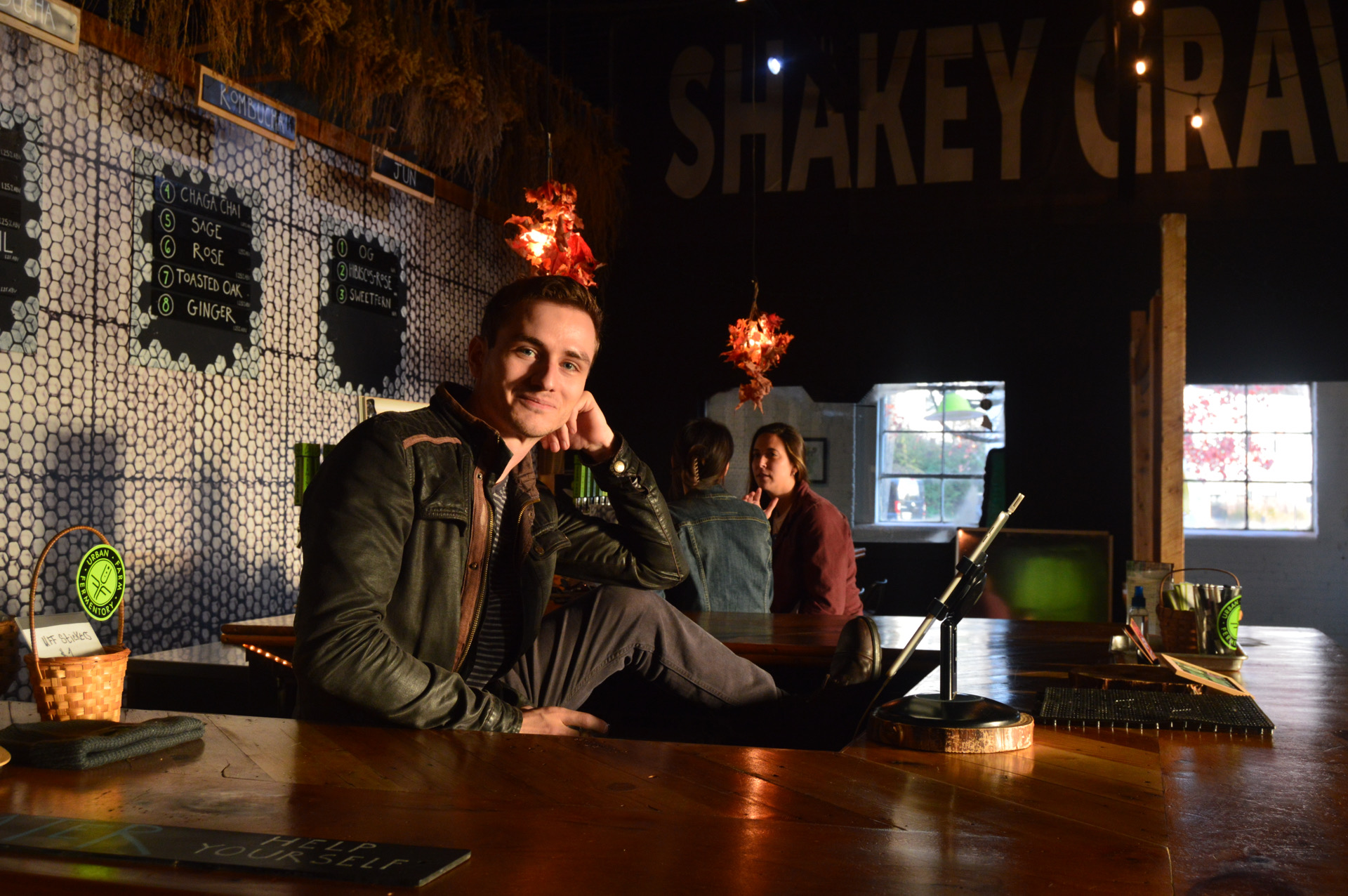As you approach the large green building, the words Urban Farms Fermentory remind you where you are. Just past the bright orange tree that is slowly losing its leaves lays a spread of picnic tables and a white fence. You enter a large space adorned with string lights and dried flowers and plants. Starting in 2010, Urban Farms Fermentory in Portland was created by owner Eli Cayer from Madawaska, ME. He is a fermenter and a beekeeper and was “excited for the seasonality and being able to capture that in a glass.” Urban Farms has been slowly getting bigger and gathering more and more space at 200 Anderson Street location. Once sharing a space with the yellow taxis of Maine, now owning the majority of the building.
Cayer created this company as a way to collect the tastes and smells and local goods of his community to take a visceral snapshot and a reflection of the time. Only using local and native ingredients as a base of all of his flavors.
Urban Farms has space for outdoor and indoor activities; the main room is filled with picnic tables and a bar that takes up the length of the room. The drafts are written in white chalk and labeled by green numbers. The green theme travels through the earthness of the space. The high ceilings allow the sound to move around in a natural room, laughs can be heard but not in an overpowering way that intertwines with others. But rather merging along with the sounds of people moving around and adjusting in their seats as they chat. Urban Farms also have two stages and invite local and out-of-state artists to share and jam out. One inside that is opposite of the bar, while the other sits below the orange tree in the front of the building.
While they don’t have a full kitchen and menu, they do rent space to Sarah’s Farmstand Kitchen that offers bowls, salads and small bites. The real star of the show are the 24 local drafts that are offered. Divided into five sections, four of which are naturally gluten free while all five are vegan and made from local and foraged ingredients.

Kombucha is made from cane sugar and tea, Cayer says the opposing characteristics between jun and kombucha is the use of sugar over honey, and that kombucha is “mildly alcoholic at 1-1.5%.” Jun is similar to kombucha but doesn’t use cane sugar, but rather honey. It’s also non-alcoholic and has a different natural bacteria compared to the others. This bacteria is called scoby, which is a symbiotic culture of bacteria and yeast and the fermentation of lactic acid and acetic acid.
Cidah and cider are one of the biggest debates according to Cayer, “the biggest difference is that we don’t make cider, only cidah.” Cidah is used with the fresh pressed and native apples as base to make the cider and then the fermentation happens that creates cidah, while cider is fermented apple cider and uses commercial pasteurized cultures.
While mead is made from fermentation of honey. Lastly, are gruit and beer, the only two things that are not gluten free as these are grain fermentations. Gruit has no hops and uses plants to create the bitterness and taste.
These five products that Cayer and his team of four all do the composing of the products on site in Portland and create the new flavors and tastes. The mission for Urban Farms is to, “create a reflection of the seasons and flavors of the local areas, we want to make Urban Farms around various locations and capture the spaces where they are.” Which is why it’s so important to Cayer and Urban Farms to support local artists and events, to have apples from Giles in Alfred, ME, local honey and even forage and gather items.
“I enjoy making the flavors of the area, and also creating a space for communities to come together and be engaged.” Urban Farms often has live music, fashion shows, charity events, they host private events and social gatherings.
Currently Cayer’s top flavors on tap are, “the cranberry kombucha, the sweet fern jun, and we recently partnered up with Coffee By Design to create an espresso stout.” Most of the visitors are from hearing word of mouth and social media. Urban Farms is a place that radiates comfort and instantly being welcomed to try something new and a taste of home with local flare. Being able to sip something from Maine, made by a Mainer while listening to a Maine artist is what’s to be expected.
Located on 200 Anderson Street in Portland, and a location in Kittery, Urban Farms can be found in Trader Joes and over 50 Hannaford locations. Plus being on tap in New York, Massachusetts, Pennsylvania, Rhode Island, New Hampshire and D.C. In Portland they are open Wednesday through Sunday from (6 p.m. on Wednesday) 12 p.m. to 7 p.m. Urban Farms can be found online @urbanfarmfermentory on Facebook and Instagram.

